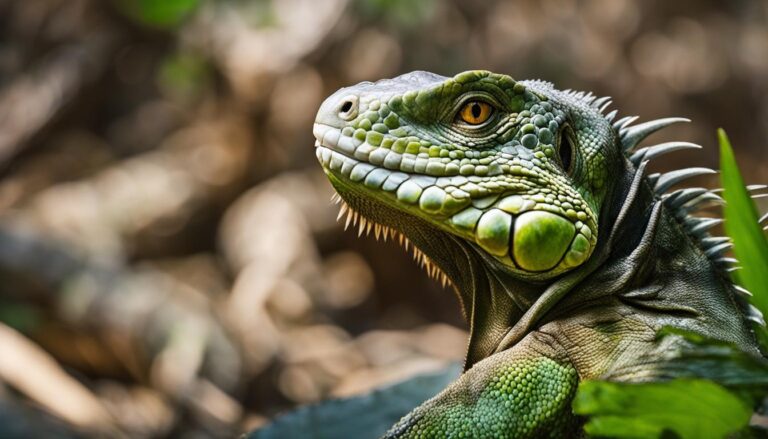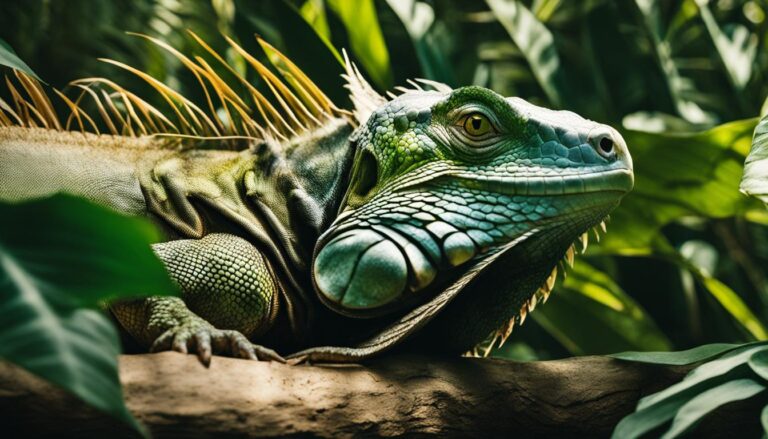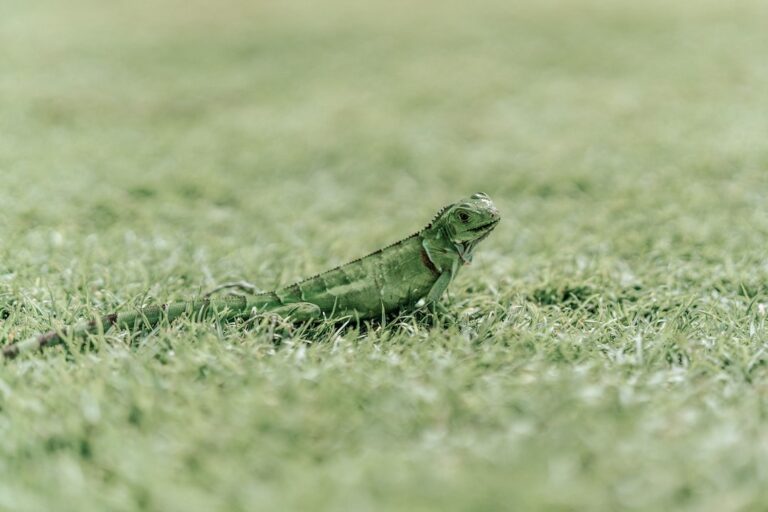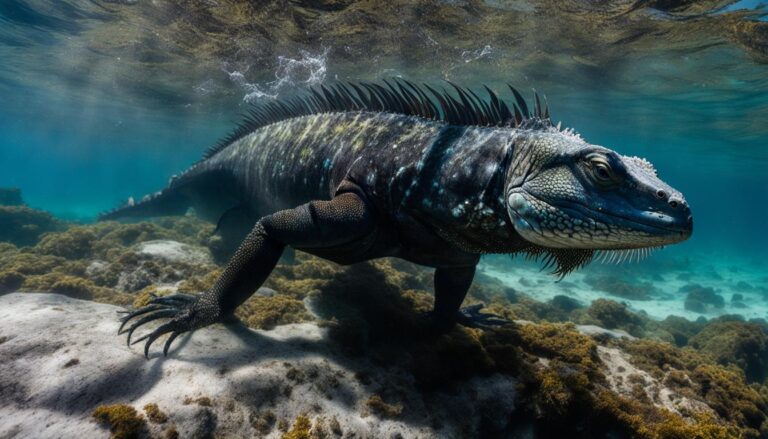Do Iguanas Poop A Lot?
Iguanas are fascinating reptiles that are native to Central and South America. They are known for their distinctive appearance, with their long tails, spiky crests, and vibrant colors. Iguanas are herbivores, meaning they primarily eat plant matter such as leaves, fruits, and flowers. Their digestive system is specifically adapted to process this type of diet.
The digestive system of an iguana consists of several organs that work together to break down food and absorb nutrients. When an iguana eats, the food enters its mouth and is chewed by its sharp teeth. From there, it travels down the esophagus and into the stomach, where it is further broken down by stomach acid.
After leaving the stomach, the partially digested food enters the small intestine, where most of the nutrient absorption takes place. The remaining waste then moves into the large intestine, where water is absorbed and the waste material is formed into feces. Finally, the feces are eliminated through the cloaca, which is a common opening for both waste elimination and reproduction.
Table of Contents
How Often Do Iguanas Poop?
The frequency of iguana poop can vary depending on several factors, including their age, size, and diet. Generally, adult iguanas will poop once or twice a day. However, it is not uncommon for them to go a few days without pooping.
Compared to other reptiles, iguanas tend to have more frequent bowel movements. For example, snakes may only poop once every few weeks or even months. This is because snakes have a slower metabolism and can efficiently extract nutrients from their prey.
Factors That Affect Iguana Poop Frequency
Several factors can affect how often an iguana poops. One of the most significant factors is their diet. Iguanas require a diet that is high in fiber to aid in digestion and promote regular bowel movements. If an iguana’s diet lacks fiber, it can lead to constipation and infrequent pooping.
Hydration is another crucial factor that affects iguana poop frequency. Like all animals, iguanas need to drink water to stay hydrated. If an iguana becomes dehydrated, it can lead to dry and hard stools, making it difficult for them to pass waste.
Temperature also plays a role in iguana poop frequency. Iguanas are ectothermic, meaning they rely on external heat sources to regulate their body temperature. If an iguana’s enclosure is too cold, it can slow down their metabolism and digestion, resulting in infrequent pooping.
Lastly, stress can impact an iguana’s digestive system and poop frequency. Iguanas are sensitive creatures and can become stressed by changes in their environment or handling. Stress can disrupt their digestive process and lead to irregular bowel movements.
The Importance of Iguana Poop for Their Health
Iguana poop may not be the most pleasant topic to discuss, but it plays a vital role in their overall health and well-being. Regular bowel movements are essential for removing waste and toxins from an iguana’s body. When waste builds up in their system, it can lead to constipation, impaction, or even organ damage.
Additionally, the appearance of an iguana’s poop can provide valuable insights into their health. Changes in color, texture, or frequency of their poop can indicate underlying health issues that need to be addressed promptly.
What Does Normal Iguana Poop Look Like?
Normal iguana poop should have a specific texture, color, and frequency. The texture should be firm but not too hard or dry. It should hold its shape when picked up but should not be overly sticky or runny.
The color of normal iguana poop can vary depending on their diet. Generally, it should be brown or greenish-brown. If an iguana’s poop is a different color, such as red or black, it may indicate the presence of blood in their stool, which requires immediate veterinary attention.
In terms of frequency, adult iguanas should poop once or twice a day. However, it is essential to note that every iguana is unique, and their poop frequency may vary slightly.
Signs of Iguana Constipation or Diarrhea
Constipation and diarrhea are common digestive issues that can affect iguanas. It is crucial to be aware of the signs of these conditions so that you can address them promptly.
Signs of constipation in iguanas include straining to poop, small and dry stools, decreased appetite, and lethargy. If an iguana is constipated, it may also exhibit signs of discomfort or pain when trying to pass stool.
On the other hand, diarrhea in iguanas is characterized by loose and watery stools. Other signs may include increased frequency of bowel movements, decreased appetite, and dehydration.
If you notice any signs of constipation or diarrhea in your iguana, it is essential to consult a veterinarian who specializes in reptile care. They can provide guidance on how to address the issue and prevent further complications.
How to Encourage Regular Iguana Poop
There are several steps you can take to encourage regular bowel movements in your iguana. First and foremost, ensure that their diet is high in fiber. This can be achieved by feeding them a variety of leafy greens, vegetables, and fruits. Avoid feeding them too many high-protein foods, as this can lead to constipation.
Hydration is also crucial for maintaining regular bowel movements. Provide your iguana with a shallow dish of fresh water at all times. You can also mist their enclosure with water to increase humidity and promote hydration.
Maintaining the proper temperature in your iguana’s enclosure is essential for their digestion. Ensure that their enclosure has a temperature gradient, with a warm basking spot and a cooler area. This allows them to regulate their body temperature and aids in digestion.
Lastly, minimize stress in your iguana’s environment. Provide them with a secure and comfortable enclosure, and avoid excessive handling or sudden changes in their surroundings. Stress can disrupt their digestive system and lead to irregular bowel movements.
Common Iguana Poop Problems and Solutions
Impaction is a common issue that can affect iguanas’ digestive system. It occurs when an iguana ingests something that cannot be properly digested or passed through their system. This can lead to a blockage in their intestines, causing constipation and discomfort.
To prevent impaction, ensure that your iguana’s enclosure is free of small objects or substrates that they could ingest. Additionally, provide them with a proper diet that is high in fiber to aid in digestion.
Dehydration can also lead to poop problems in iguanas. If an iguana becomes dehydrated, their stools can become dry and hard, making it difficult for them to pass waste. Ensure that your iguana has access to fresh water at all times and consider misting their enclosure to increase humidity.
Diarrhea can be caused by various factors, including dietary changes, bacterial infections, or parasites. If your iguana has diarrhea, it is essential to consult a veterinarian who can determine the underlying cause and provide appropriate treatment.
Iguana Poop and Cleaning Their Enclosure
Regular cleaning of your iguana’s enclosure is crucial for maintaining their health and hygiene. Iguanas are known for their large and frequent bowel movements, so it is essential to clean up their poop promptly.
Remove any feces from their enclosure daily to prevent the buildup of bacteria and odors. Use a reptile-safe disinfectant to clean the surfaces of their enclosure regularly. Additionally, replace any substrate or bedding that may have been soiled by their poop.
Understanding Your Iguana’s Poop Patterns
Understanding your iguana’s poop patterns is essential for their overall health and well-being. Regular bowel movements are a sign that their digestive system is functioning properly and that they are receiving the necessary nutrients from their diet.
By providing a proper diet, ensuring hydration, maintaining the correct temperature, and minimizing stress, you can encourage regular iguana poop. If you notice any changes in their poop frequency, color, or texture, it is crucial to consult a veterinarian who can provide guidance and address any underlying health issues.
If you’re curious about the bathroom habits of iguanas, you might also be interested in learning about the differences between chameleons and iguanas. Check out this informative article on reptilefriend.com to discover the unique characteristics and behaviors of these fascinating reptiles.







